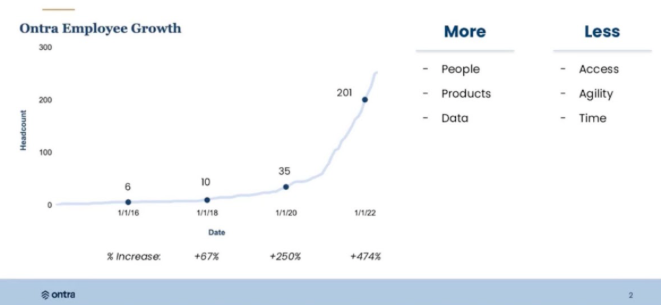Patrick Franciotti, Senior Manager of Revenue Operations at Ontra, gave this presentation at the Revenue Acceleration Festival in May 2022. Visit your SEC member dashboard now to access the full video and much more exciting content.
The challenges associated with exponential growth
The word scale is often thrown around a lot depending on the size of the company or industry. It's certainly a buzzword. But I figured that the best way to describe it is to give a little bit of insight into our own experience here at Ontra.
When you have exponential growth, there are lots of new challenges that get created. Below, you'll see a chart of Ontra’s own employee growth in the last 10 years. You can see pretty clearly that in the last two years we've hit a different level of hiring and growth.

As we're growing, there are a number of new challenges that will arise, and we're only just seeing the tip of the iceberg with this. There are many more hiring plans in place and lots of interviews going on; there are changes left and right.
As such, one of the most important things we can really focus on is building that structured process within our company.
I joined the company in 2020 when we had around 35 employees. And you can see from the chart that within the last two years we've really accelerated that growth.
Some of the challenges that we see at any company are that there are a lot more people. We’re growing into new regions, we’re creating new roles, and we’re segmenting. There are also new managers and stakeholders.
One of the most important things that we're focused on in revenue operations (RevOps) is creating alignment and strategy between the different teams, and serving as that bridge.
As you're getting more people, it becomes increasingly difficult to keep that alignment and structure without losing any of that communication or being able to stay on the same page.
On top of the people, the biggest impact that growth has is on new products and new data. There’s a tonne of different things that every operational team is tracking, analyzing, and trying to improve.
As you add more people and a company gets bigger, you're in new regions, you have new team members, new roles, and all of that data is multiplied at an exponential level.
We're always trying to make sure we never lose that alignment between all of our different teams for the data we're tracking, the products our company is selling, and the people we have at the company.
We ensure everyone’s in lockstep in completing all the most critical objectives that our company has.

On top of getting more people, products, and data, we also get less access. It’ll become more challenging to access all the different stakeholders that you need to be supporting.
Whether it’s your own manager or someone at the C-suite level, the bigger you are, the harder it's going to be to access different stakeholders to create that line of communication and make sure everyone's on the same page.
So this growth is pressing the boundaries when it comes to keeping alignment. And one thing we'll talk about in this article is how RevOps keeps that structure and makes sure we don't lose that alignment.
Another thing that we lose a bit of is agility. The bigger the company and bigger the team, the harder it is to make changes quickly and seamlessly.
At Ontra, we tried to plan our RevOps department ahead of the expected growth that we were planning on seeing at the company.
The bigger it is, the harder it is to change it, so we wanted to make sure that we could put the right team in place at the right time to get that foundation in place before any of this exponential growth started to take place, and build that foundation for all our different go-to-market (GTM) teams.
One of the most important things you're losing is time.
There are a tonne of things going on whether a company consists of five people or 200 people. And as you can imagine, the bigger you are, the more difficult that gets.
When you’re trying to find time on people's calendars, trying to be flexible in terms of changing processes, or implementing a new tool, this time aspect becomes very difficult in being able to manage that.
There's a tonne of stuff going on across every department of the company. Even with a five-person company, you see this challenge already of trying to find time, with people trying to make everything work at the same exact time as you’re hiring.
We're always trying to be more efficient; we don't want to waste anyone's time. So to us, part of that efficiency comes from forming a RevOps team.
It's a relatively new team, and not just at our company.
So, what exactly is RevOps?
The RevOps department is evolving, and the way we describe it at Ontra is:
Creating strategic, operational alignment across the prospect-customer-supply lifecycle to maximize efficiency, transparency, and profitable and predictable revenue growth.
This might sound like a lot of buzzwords, but we were very thoughtful in coming up with this definition of RevOps. This might not be relevant to all companies, but for us, this was the definition that made the most sense.
Efficiency, transparency, and profitable and predictable revenue growth are the areas where our team needs to make an impact. We're trying to make sure we can do all these things ahead of time.
We're always trying to make sure that we can create that structure and process that's going to allow our company to scale and grow without really challenging obstacles that are going to be more difficult to overcome or change as your company or team is getting bigger.
Why do we need RevOps?
Although we know what RevOps is and we were very thoughtful about how we defined it, the bigger question remained: Why do we need it?
We already have people doing operations; we have sales ops and marketing ops, so why are we creating this new RevOps team?
Is it just a fancy way of combining a whole bunch of different people?
You may think that at first, and it's a valid question, but some of the changes that we've already seen as a RevOps team here at Ontra have made a huge difference, and I really want to outline what the before and after look like for our team and for our company.
Ensuring alignment is extremely time-consuming and can be very difficult when all these different teams are working on different processes.
We're not communicating in the best way and it's a little scattered, but what we can do with the RevOps team is align all these go-to-market teams and create that profitable revenue growth through the optimization of our multiple funnels.
Every company’s funnels may be a little bit different, but this is a pretty solid framework that we use to help understand the flow of our business and the flow of the processes that the RevOps team is trying to support.
Without the revenue operations team, you have the sales ops, marketing ops, and customer ops teams, but it's much more challenging to scale those processes across all of the GTM functions.
We have individual departments that are all focusing on their goals and objectives. But what becomes more challenging is understanding the impact and the ripple effect that some of those processes or changes may have across all of our GTM teams.
The goal of RevOps is to connect all these and create a scalable team and a scalable process that will put together the entire customer lifecycle from prospect to expansion.
As a RevOps team, we're trying to create that transparency from the moment a company is out there in our total addressable market, so we can fully expand that customer and get as much wallet share from them as we possibly can.
With those siloed teams, it becomes much more difficult. But with a RevOps team, we think we have the right structure in place to really connect all these processes and enable all of our GTM teams to do what they do best, and not focus on things that are outside their day-to-day.
Blind spots exist across all ops teams when you're not centralized or working in a cohesive manner. People are using different tools, you're maybe operating with different data, different definitions, and different KPIs.
Before we had revenue operations at Ontra, I noticed this and was almost at the forefront of why we needed revenue operations.
I talk about opportunity all the time, and it can mean a million different things depending on who you're talking to. So it's very important to have a team like RevOps that can create that transparency and enable that accessibility into all of our sources of data.
As such, it's a lot clearer as to what we're talking about when you have a team that is that centralized resource to make sure that everybody understands that word, opportunity. We just want to make sure that everyone has access to the right data and can make the right decisions at the end of the day.
If you don’t have that structure and you have data scattered across different sources, without a solid understanding of what these definitions are, it can be misinterpreted and defined differently - that creates more time spent trying to align and figure out who's talking about what.

With these shared definitions and KPIs, we’re enabling as much strategic decision-making as we possibly can. The best we can do is to make decisions that we feel are the best choice for our company, and a lot of that comes from making those decisions with data.
If we're using different kinds of data, it makes it a lot more difficult to understand the impact of these decisions, trying to forecast and determine what might happen if we do X or Y.
If you're not all speaking the same language, whether it's about an opportunity, a revenue metric, or a financial metric, it will create a lot of misalignment. And it's definitely challenging to course correct those kinds of issues.
Ontra’s RevOps mission statement
It's very critical that we align on what we're trying to do as a RevOps team. We put a lot of time into trying to come up with our mission statement. What are we really trying to do as a RevOps team? So we've come up with five different goals and objectives that we think our team is responsible for.
Align on a common set of KPIs
Increasing that alignment is absolutely critical to the success of our team.
Having those shared definitions is so important, that everyone is speaking the same language and we always understand what the other stakeholders are talking about.
That we can facilitate this data, understand that we're all using that same data and there’s no confusion about an opportunity or a new customer.
Ensure key GTM data is reliable, complete, and easily-accessible
This is so all of our GTM functions can operate effectively. This probably seems a little obvious, but it’s very easily lost when you have a number of different operations teams potentially working in silos, or in a non RevOps structure.
If you're not able to support your GTM functions, sales, marketing, or customer operations, that's what we're here for.
We're not selling the product, but everything we're going to do is to enable those teams to do what they do best. We want to free up their time to help them be as efficient as possible.
Enable end-to-end visibility of the customer lifecycle
This helps us understand the profitability of different customer segments. This is where we're starting to get a little bit more prescriptive for our RevOps team.
We’re able to provide recommendations, be consultative, and understand the most important levers and drivers of increasing that revenue growth.
This takes time, it's not something that pops up overnight.
You certainly won't be able to identify these kinds of drivers immediately without all these other things that we've been talking about like alignment, structure, and sharing the same data and definitions.
Our entire job is to understand and create the structure and alignment.
Assess the effectiveness and ROI of all GTM activities
This is arguably the most important thing that we need to do as a RevOps team. This is so we can improve resource allocation and figure out what's working and what's not.
This is really at the crux of what RevOps is supposed to be doing.
At the end of the day, our job is to support the business in as many ways as we can. And the number one way in my mind is figuring out the ROI. What’s working and what’s not working?
Whatever is working, let's put our foot on the gas and speed that up, whatever isn’t working, maybe we need to pivot a bit and rethink what we have going on here. And we are the team to do that.
We are the centralized, structured, aligned operational team that has the expertise and processes in scaling, growth, and making sure these boundaries don't break between all of our different GTM teams.
Improve GTM processes and handoffs between GTM functions
This is again putting us in this centralized place where we are the experts in making sure these processes run smoothly.
Whether you're at 50 employees, 200 employees, or 1000 employees, these handoffs don't change. There are definitely points in our GTM processes that we need to go from sales to account management, and from marketing to sales. Those handoffs are critical and can create huge value for our different teams.
Not being able to hand these off correctly or lose time between all these could be the difference between 10 customers and 20 customers.
We really want to make sure that all of these handoffs are seamless and we're freeing up our teams to focus on whatever is most important in their job.
For sales, we want to make sure that they can focus on selling.
That's why they were hired here and that's what we rely on them for. We don't want them focusing on who to hand things off to.
"Where does this opportunity go next? Where do I log this data? Does it log automatically?"
These are all different kinds of questions that I think people may ask if you're not having the seamless handoffs and creating that alignment between all the different teams.
So we've come up with this mission statement as a RevOps team here at Ontra.
I think every team and every company can probably come up with something that’s a little different, but the main goal of a RevOps team is more or less similar as you go from company to company, depending on the size and the industry.
The importance of getting buy-in for your RevOps team
As a RevOps team, not only do we need to understand what is and isn't working, we need to figure out how to accelerate what is working, and we need to figure out how to improve what isn't working.
Our whole job is to support these GTM functions. I really try to make this evident with our own team. Our RevOps team is here to help and provide strategic recommendations based on our own expertise of understanding these processes.
We’re almost like an encyclopedia of our own business, knowing the who, what, where, why, and how of all these different processes we have going on.
One example I always use is prospecting.
What do I do if I want to prospect someone? Where do I go to find them? What happens when I find them? What do I do if I want to email them? How do I measure any kind of email data?
It's a really simple activity that’s found throughout any kind of company you're working for. But I think it serves as a great example as to understanding these questions that we're asking, the who, what, where, why, and how of all the different things that we do.

As a RevOps team, we’re centralizing that knowledge and expertise so we can make sure that what's happening in the top of the funnel is not impacting what's happening on the other end of the funnel from an expansion or the customer side of the business in a negative way.
We've seen a lot of success so far with our revenue operations team. It's definitely a newer structure that a lot of companies are going through, and luckily here at Ontra we've had a tonne of support and guidance from the entire company.
We’ve been lucky to have that kind of enablement, and to increase that adoption and understanding of what our RevOps team is even doing.
It's very important that you have that buy in, and you have colleagues, co workers, and stakeholders that really understand what the RevOps team is trying to do.
Centralizing a team like this can be challenging and can certainly have its own setbacks if not done correctly, and we're still figuring it out.
We're a newer RevOps team, and nothing is going to be perfect the first time you try it, but I think that's the essence of what we're trying to do.
Just as much as we're supporting the other GTM functions and trying to free up their time, we also need to figure out our own processes within our RevOps team. Who's doing what? Where do we draw the lines to figure out what RevOps is doing versus what the sales team is doing? That is a crucial component of understanding how effective we can be.
At the end of the day, we need to drive value, and we need to create an impact.
Being a centralized team, we want to make sure that we can be those trusted support team members and operational experts. We need to build that trust, and we need to earn that trust from our different stakeholders.

If we don't have that buy-in from the different teams that we're supporting, we're running in circles here.
So above all else, making sure that you have that alignment, communication, and structure with all the teams you're supporting is absolutely critical to making sure your RevOps team is successful.
Like I said earlier, we've been lucky that our RevOps team has had this kind of support from our different stakeholders, helping us understand what their needs are, and how we can drive value for them and create that impact.
It has been the biggest help in getting this team up and running, figuring out where we make these impacts, and what's most important for all these different stakeholders.
We've had all that support and buy-in which has really helped us succeed and hit the ground running from a RevOps team perspective.
What does the future of RevOps look like at Ontra?
I'm really excited for the rest of our year here at Ontra. We have a bunch of new employees, we’re a growing team and a growing company, so there'll be plenty more challenges for sure.
But I think one thing we've done at the right time was create this RevOps team.
We put that foundation in place to make sure as we start growing even more, none of this alignment breaks and none of the structure falters in any piece of the puzzle here in our GTM function.
We’re really excited because the company has a RevOps team to take on the rest of our objectives for 2022.
I think the sky's the limit for us or for any revenue operations team; the value that we can all create is so immense that it’s fun coming to work, it's fun supporting these different teams, and it's fun finding new insights.
Thank you for reading, I hope you found this useful.


Sales enablement insider
Thank you for subscribing
Level up your sales enablement career & network with sales enablement experts
An email has been successfully sent to confirm your subscription.
 Follow us on LinkedIn
Follow us on LinkedIn





